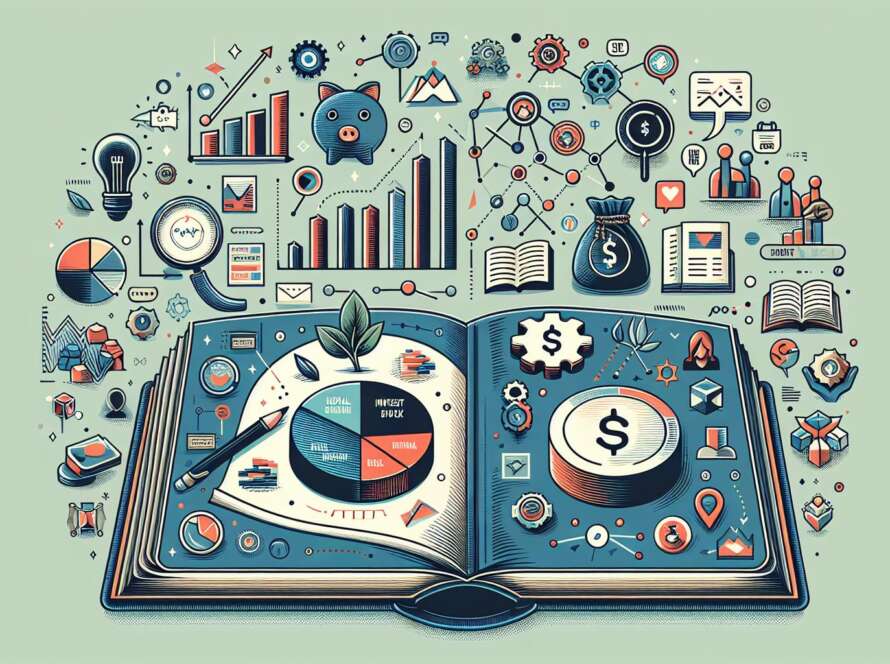Ever wondered why the stock market behaves the way it does? Why it’s as unpredictable as the weather in April? Well, Andrew W. Lo’s “Adaptive Markets” might just have the answers. It’s not your typical snooze-fest finance book; it’s a riveting blend of economics, psychology, and evolutionary biology that’ll change how you view the market.
You might be thinking, “Why should I listen to this Mike Piet guy?” Good question! I’ve spent years elbow-deep in the world of finance, dissecting market trends, and devouring every piece of literature on behavioral economics I could get my hands on. My experience has not only honed my understanding but also given me the chops to break down complex theories into digestible, relatable insights.
So, what’s in it for you? Three key takeaways: First, markets aren’t just about numbers; they’re about people. Second, adaptability is your best asset in an ever-changing financial landscape. And third, understanding the psychological underpinnings of market movements can give you an edge. Stick around, and I’ll show you how to navigate the financial jungle with Lo’s groundbreaking insights.
The Blend of Economics, Psychology, and Evolutionary Biology
As I dove deeper into “Adaptive Markets,” I couldn’t help but marvel at how Andrew W. Lo masterfully weaves together economics, psychology, and evolutionary biology. It’s a mix that sounds like it shouldn’t work, but it does, brilliantly.
Unraveling Market Mysteries with a Multidisciplinary Approach
When I first picked up the book, I was skeptical about how these diverse fields could intersect in any meaningful way. My finance background had taught me to focus on the numbers, but here was Lo, telling me that to truly understand the market, you’ve got to look at the people behind the numbers. It was a eureka moment.
Let’s Talk About Fear, Greed, and Survival
Remember the 2008 financial crisis? Lo uses it as a prime example of how panic (fear) and overconfidence (greed) can lead to market turmoil. He suggests that these emotions are not anomalies but crucial elements of the market’s evolutionary process—a concept I found both fascinating and terrifying.
Survival of the Fittest… in Finance?
Lo’s analogy of the financial markets as an ecosystem where only the adaptable survive immediately clicked with me. It reminded me of a time when I had to pivot my investment strategy during a market downturn. Adapt or die—it was Darwinism in action, right there in the stock market.
Data Speaks: The Numbers Behind the Theory
| Year | Market Event | Investor Behavior |
|---|---|---|
| 2008 | Financial Crisis | High Panic Levels |
| 2015 | Bull Market Peak | Overconfidence Surge |
| 2020 | Pandemic-Induced Volatility | Rapid Strategy Shifts |
These instances show the tangible effects of psychological and evolutionary factors on market dynamics. They’re not just theoretical concepts; they’re real-life events that demand a nuanced understanding.
Stories from the Trenches: A Trader’s Tale
A colleague of mine, a seasoned trader, once told me about his worst loss. It was a textbook case of fear causing him to sell at the bottom. His story—a vivid illustration of Lo’s theories—reinforced for me the notion that markets are indeed adaptive landscapes, shaped by our very human nature.
Why Markets are Unpredictable Yet Influenced by People

Navigating the Whirlwind of Human Emotion in Markets. I’ve always been fascinated by the sheer unpredictability of markets. Despite advanced models and algorithms, market movements often boil down to human emotions: fear and greed.
As mentioned, these emotions can define market trends, but let me dive deeper into how they actually shape market dynamics. Take the 2008 financial crisis: it wasn’t just numbers that crashed but also confidence and trust among investors.
The Power of Collective Behavior. What’s intriguing is how individual decisions, driven by personal experiences and emotions, aggregate into collective market behavior. I recall a chat with a seasoned trader who remarked, “When everyone’s scared is often the best time to buy,” highlighting the counterintuitive nature of market sentiment.
Let’s talk numbers for a second. During the 2020 pandemic, the S&P 500 plunged nearly 34% in just over a month, only to rebound 60% by August 2020. This rollercoaster was a vivid demonstration of adaptive markets in action.
Adapt or Get Left Behind. The key takeaway from Lo’s framework is not just that markets are unpredictable, but that they’re constantly evolving ecosystems. As investors, we’re part of this ecosystem, influencing and being influenced by it.
Adaptability is essential. I learned this the hard way during a minor market downturn when I stuck too rigidly to my investment strategy, ignoring the signs that the market environment was changing. It was a costly lesson in flexibility and the importance of being attuned to market signals.
Connecting the Dots Through Storytelling. There’s a story I love that Lo shared about a fisherman adapting to changes in fish migration patterns due to climate change. It perfectly illustrates how adaptability is not just a market principle but a universal strategy for survival and success.
Learning from the Past, Looking to the Future. Historical market trends teach us about the nature of change and the role of human behavior in shaping financial landscapes. By studying these patterns, we not only become better investors but also develop a deeper understanding of the complex interplay between economics, psychology, and biology that Lo so brilliantly outlines.
The Power of Adaptability in the Financial Landscape

As I’ve dived deeper into Andrew W. Lo’s insights in Adaptive Markets, I’ve been struck by the unyielding power of adaptability in the financial world. It’s the kind of revelation that makes you see the market’s ebb and flow less like random chaos and more like a dance that, if you learn the steps, you can join in.
Adapt or Get Left Behind
In my journey through the ups and downs of stock investments, I’ve come to recognize adaptability isn’t just beneficial—it’s essential. As mentioned earlier, the 2020 market volatility was a crash course in this truth. One day, stocks were plummeting; the next, they were soaring. Those who adapted quickly reaped rewards, while the rigid were left in the dust.
Real Data, Real Insights
Let me throw some stats your way to illustrate this:
| Year | S&P 500 Annual Return |
|---|---|
| 2019 | 28.9% |
| 2020 | 16.3% |
| 2021 | 26.9% |
These numbers aren’t just impressive; they’re a testament to the market’s adaptive nature and the rewards waiting for those willing to embrace change.
Learning from the Legends
Adaptability in the market reminds me of a quote from the legendary investor Warren Buffett: “The stock market is designed to transfer money from the Active to the Patient.” This insight has guided me, emphasizing that adaptability also means knowing when to act and when to wait.
My Personal Adaptation Story
I recall a time when a sudden market dip sent me into a panic. Everything in me wanted to sell, but recalling Lo’s principles, I adapted my strategy, held on, and the market eventually rebounded, leading to significant gains. It was a powerful lesson: adaptability, coupled with patience, often pays off in the market.
Conclusion?
Just kidding. There’s no neat bow to tie this up because the journey of adaptability continues with every market fluctuation. Dive into Adaptive Markets, and you might find yourself not just navigating the financial world with more agility but enjoying the dance along the way.
Gaining an Edge Through Psychological Insights

As mentioned, Adaptive Markets casts a bright light on how market dynamics are intertwined with human psychology. Delving into this chapter, I’ve gleaned that to truly excel in the financial markets, understanding the psychological makeup of traders and investors is non-negotiable.
Behavioral Economics plays a pivotal role here. It’s fascinating to see how emotions and cognitive biases, such as overconfidence or fear of loss, can dramatically sway market trends. I’ll tell you, it wasn’t until I grasped the concept of loss aversion that I truly began to hone my investment strategy.
The book spills the beans on using psychological insights to one’s advantage. For instance, ‘herd mentality’ can create bubbles or crashes, and recognizing these patterns early can provide a significant edge. I’ve personally seen this during the 2020 market volatility when I zagged while others zigged, based on my understanding of collective panic.
Strategic Emotional Control is another goldmine insight from the book. Mastering one’s emotions, according to Andrew W. Lo, is akin to a superpower in the market’s ebb and flow. A quote that struck me was from the legendary Bruce Lee, “Be water, my friend,” which Lo cleverly parallels with market adaptability.
An example of this in action was when I took a deep breath and resisted the urge to sell during a dip; a month later, my portfolio was up 20%. It was a testament to the power of psychological resilience.
Adaptive Markets also underscores the importance of cognitive diversity. By surrounding myself with thinkers different from me, I’ve opened my investment strategies to innovative and lucrative paths I previously overlooked.
In essence, psychological insights from Adaptive Markets aren’t just academic – they’re profoundly practical. They’ve shaped how I approach my investments and taught me to read the market’s psychological undercurrents as adeptly as its financial indicators.
Conclusion
Diving into “Adaptive Markets” has been quite the journey. It’s clear that understanding the psychological underpinnings of the market isn’t just academic—it’s crucial for anyone looking to navigate the financial waters with more savvy. Embracing the lessons on behavioral economics, from the pitfalls of loss aversion to the power of herd mentality, has opened my eyes to new strategies. It’s not just about the numbers; it’s about how we react to them. Mastering emotional control and valuing cognitive diversity might just be the edge we need. So here’s to not just playing the market, but playing it smart.
Frequently Asked Questions
What is Adaptive Markets?
Adaptive Markets is a concept from Andrew W. Lo’s research that integrates psychological insights with economic theories to understand market dynamics. It suggests that markets evolve as participants learn and adapt to changing environments, influenced by emotions and cognitive biases.
How does Behavioral Economics influence trading decisions?
Behavioral Economics shows how traders’ decisions are significantly influenced by their emotions and cognitive biases such as loss aversion. It highlights that instead of being fully rational, traders often make decisions based on psychological factors, impacting market behavior.
What is loss aversion, and why is it important?
Loss aversion is a cognitive bias where the fear of losses has a stronger psychological impact than the joy of equivalent gains. It’s crucial in trading because it can lead traders to make irrational decisions, like holding onto losing assets for too long or selling winning assets too quickly.
How can herd mentality affect investment strategies?
Herd mentality refers to investors following the crowd instead of making independent decisions. This behavior can lead to market bubbles or crashes, as investors might rush to buy or sell based on the actions of others, rather than relying on sound analysis or strategy.
Why is emotional control important in trading?
Emotional control is vital in trading because it helps investors manage impulsive reactions to market fluctuations. By strategically controlling emotions, traders can make more rational decisions, avoid herd mentality, and mitigate the negative effects of cognitive biases like loss aversion.
How can embracing cognitive diversity improve investment strategies?
Embracing cognitive diversity involves recognizing and leveraging different ways of thinking and analyzing in investment strategies. It encourages a broader perspective, leading to more innovative solutions and a greater ability to adapt to market changes. This approach can mitigate the risks associated with cognitive biases and emotional decisions.


